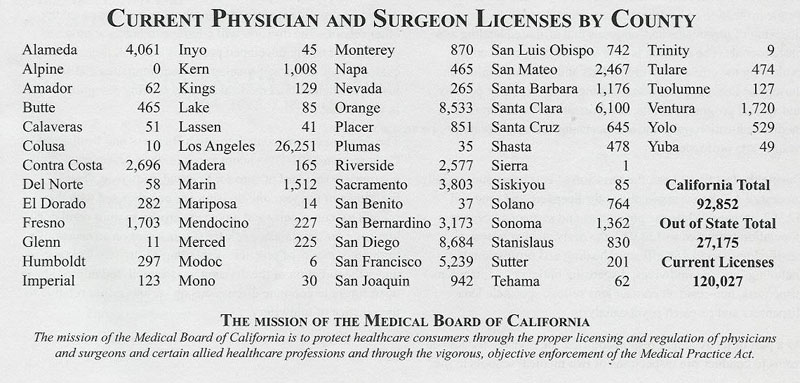Perusing the latest California Medical Board report (warning:pdf file), I was struck by the number of CA licensed docs who don’t live in the state:
So, 92,852 out of 120,027 CA licensed docs live in the state (77%). I knew I wasn’t the only doc with a license there who lives elsewhere, but had no idea there were twentyseven thousand of us.
To see if this was a CA thing or not, I compared the Texas numbers:
And found that 77% of the docs live in-state. The exact same percentage of licensed docs in the two states actually live in their respective states. That’s really odd.






It’s not THAT odd…think about all the hoops you have to jump through in order to get state licensure…it’s easier just to continue paying for them, even if you no longer work in that state, if there’s a potential for you to go back. Which reminds me…I think I have to renew my GA license soon…
Sorry, what I thought was odd was that the percentages were the same.
I agree, it was such a pain to get licensed in both states I intend to keep these forever.
I think we can deduce from this that Texas actually is the same place as California.
(sorry, originally posted in the Alzheimer’s comments — how appropriate)
I wonder how smaller states compare. It seems to me that most doctors get licenses where they train and wherever they go to work afterward, and maybe in their home state if that isn’t where they work or train (unless you are in the military, then you can apply wherever the fees are lowest). Small states with lots of training programs like Massachusetts graduate lots of doctors who might go elsewhere for beter practice opportunities. At the same time, why pay hundreds of dollars a year to keep a license in a far-away state? So over time, as doctors get settled, it might become easier to lapse a license somewhere you think you will have little chance of ever working again.
California and Texas are large states with lots of university-based training programs and large populations. It is probably easier to stay in-state after training there. I remember the trouble many of my colleagues going to California had in applying for licenses there, actually having to crate-up their diplomas and ship them to Sacramento withtheir applications. It is a huge nuisance, and I can see why no one would want to lapse their license there once recieving it.
Remember that having licenses in two or more states can get you “flagged” when applying for malpractice insurance or hospital privileges. It’s not necessarily a bad thing but you may have to provide additional information as to why you have a medical license in one or more other states.
The thought of taking the Med Jurisprudence test again has kept me donating the the State every year.
I would have actually guessed the numbers would be higher. I just renewed my license in Massachusetts even though I no longer live there, figuring I might move back someday
Taking 1/0.77 I calculate that about 30% of docs are licensed in 2 states (assuming the rate is constant across states) which seems low to me. If anything, states w/o big training programs might have a lower ratio.